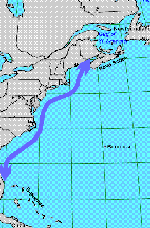
Today's News

Spring's Journey North

Report Your Sightings

Search Journey North
return to:

 A/CPB
A/CPB
Background
 |
|
Migration Route of North Atlantic Right Whales Map courtesy of |
Along the way, students will explore why whales migrate and why they go where they do. Students will learn that
these gentle giants-which grow to 60 feet long and weigh up to 100 tons - survive by eating tiny ocean plankton
and small fish. At the same time, they build up huge fat reserves to live off during their migration south when
they will stop eating entirely. They'll explore the ocean process of "upwelling" which creates a far-reaching
food chain that whales and many other ocean creatures depend upon. In addition, students will study the conservation
issues facing these endangered creatures and explore why one species, the humpback, is making a stronger recovery
than the northern right whale. Students will have the chance to "interview" other students who will take
actual whale-watching expeditions and report their experiences. Finally, if we're lucky, we'll receive reports
on gray and humpback whales and an orca or two from our friends in the Pacific.



